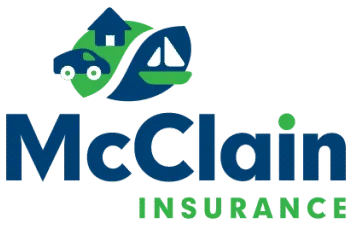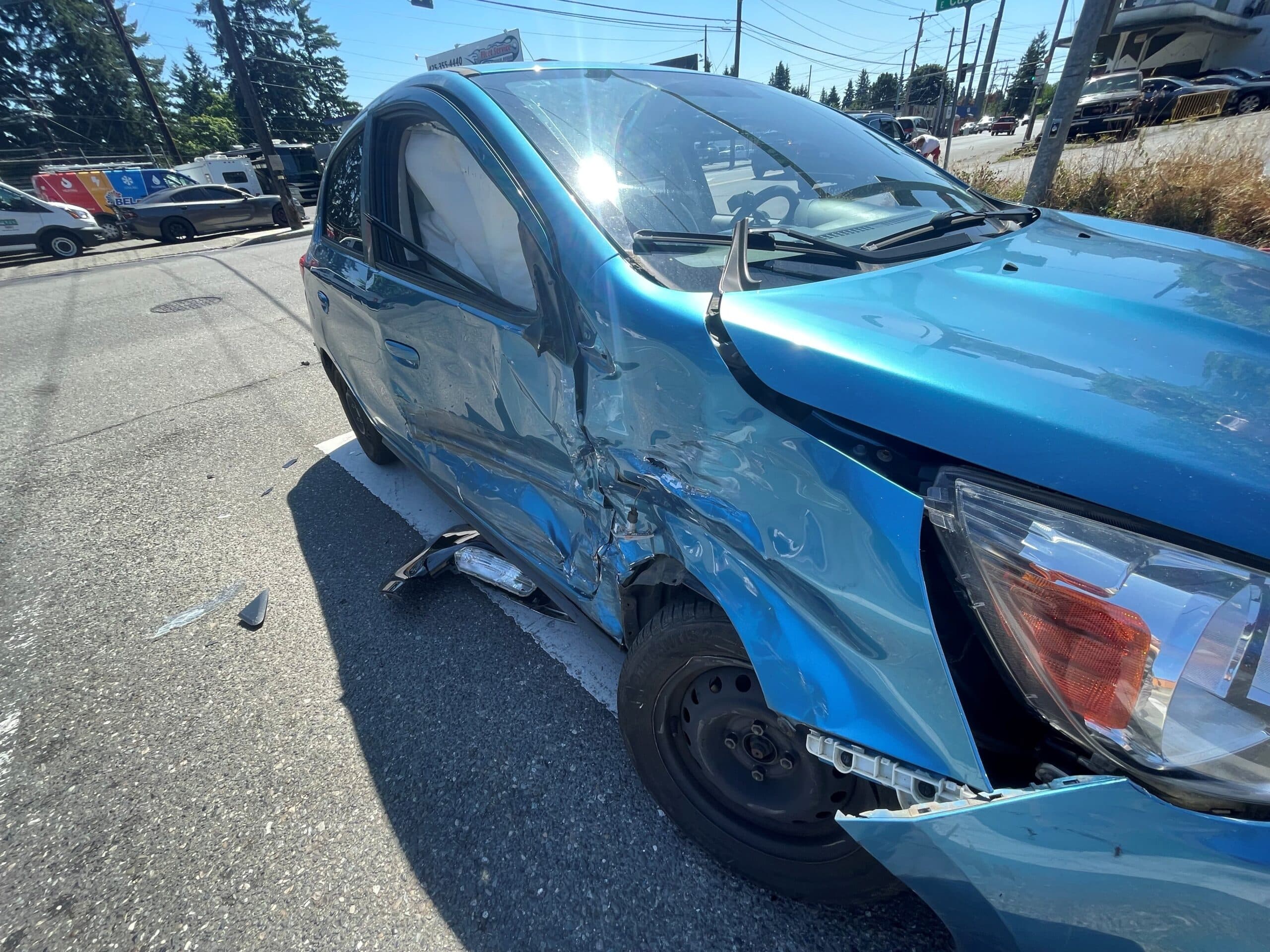As insurance professionals, we talk about accidents a lot. We’ve walked clients through claims, repairs, rentals, and more. We’ve shared the importance of coverage, preparedness, and staying calm when the unexpected happens.
But what about when the unexpected happens to us?
On the very same Monday in July, Aja and I (Meghan) were both in car accidents. (After the second collision, Nick messaged the rest of the team to maybe just stay off the roads for the rest of the day…)
Aja’s accident was more serious: a three-car T-bone collision that left her vehicle totaled. Mine was a lower-speed fender-bender in a parking lot that caused a broken taillight and damage to my bumper.
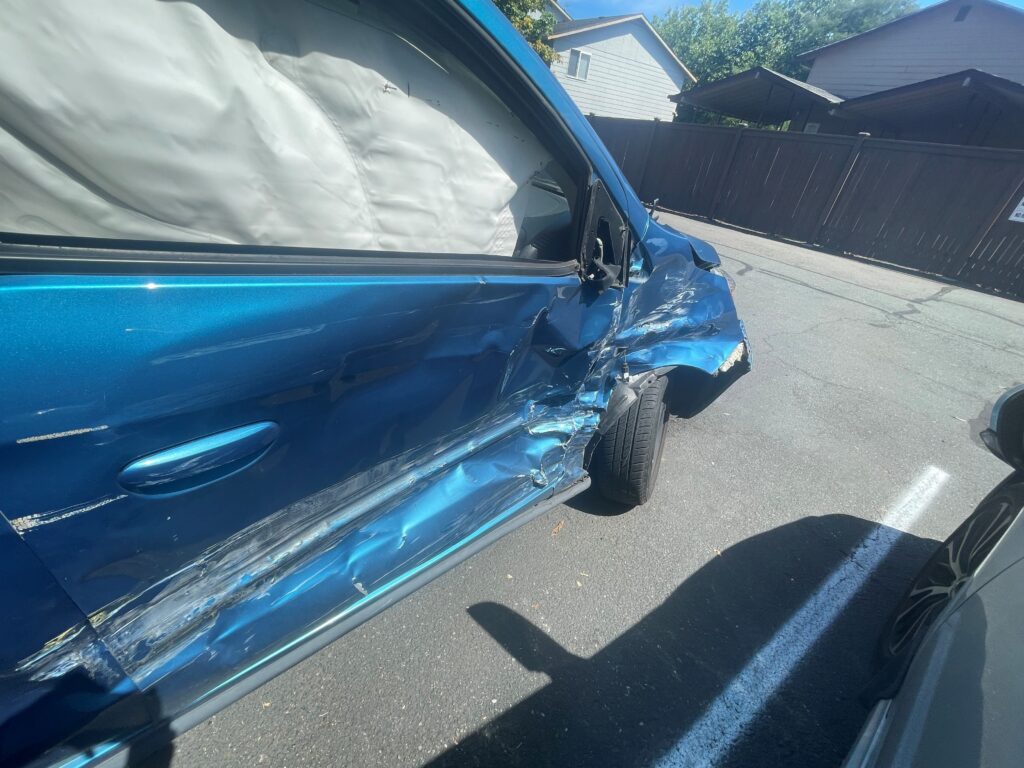
Aja and I talk about insurance every day. Aja works directly with our clients to help them understand their options, navigate claims and feel more confident about their coverage. As one of our agency co-owners, I support client communication and education – I spend a lot of time thinking about how to help people make better insurance decisions.
But in the aftermath of a collision, that knowledge can fly right out the window. So with our experiences still fresh in our minds, we’re sharing our top 5 takeaways to remember if you’re ever involved in an accident.
What to Expect After a Car Accident: 5 Things to Keep in Mind
1. Document everything: Adrenaline is real — and it clouds your memory.
The moment after an accident can feel like a blur. Even in a relatively minor incident, your brain goes into overdrive: Am I hurt? Are they hurt? What just happened? What do I need to do?
The first priority is making sure that all passengers and drivers are okay and receiving care if needed. For more serious collisions, or something that blocks the roadway, police and emergency crews may respond.
For all collisions, do your best to document the scene and what happened. Avoid admitting fault — that’s what adjusters are for. Just gather the facts: Take photos of damage (your vehicle, other vehicles, nearby structures). Get the other driver’s name, contact, and insurance info.
Pro tip: Download your auto insurance company’s app now, before you need it. Our carriers all have accident checklists in their apps to walk you through the information you need to collect in the event of a collision.
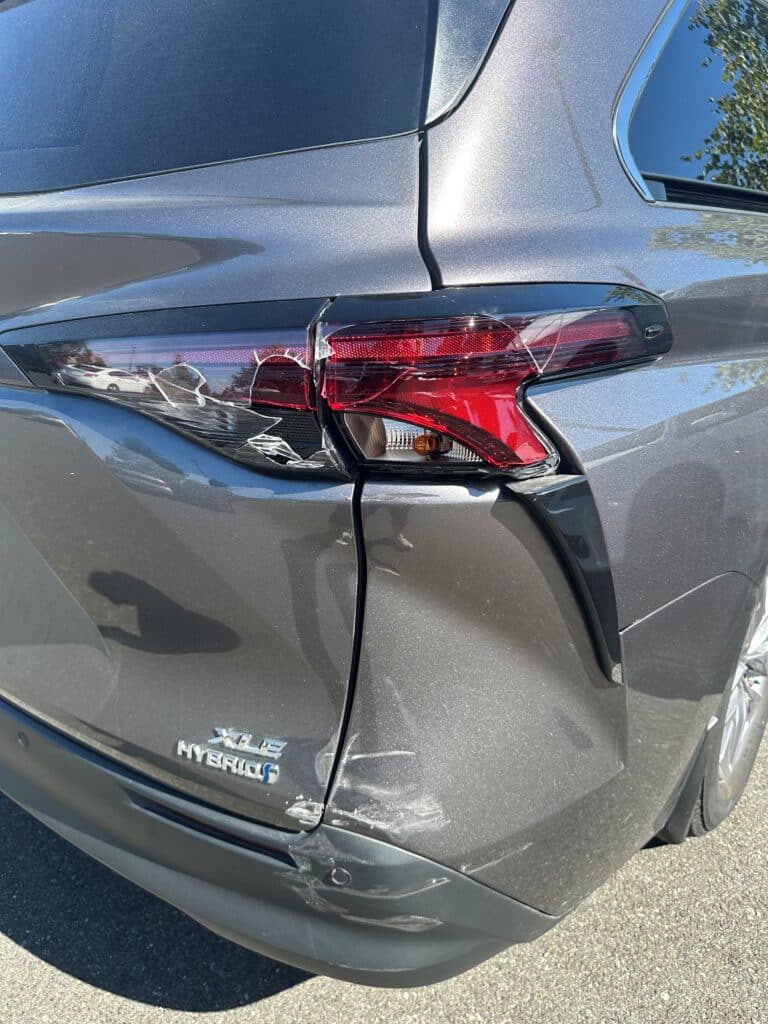
Here’s something I didn’t realize before my collision: After an accident, you might be contacted not only by your own insurance company, but also by the other driver’s. Both may ask you to give a recorded statement about what happened.
When I called Nick right after my accident, he gave me some invaluable advice: take a minute to write down everything you remember while it’s still fresh. That quick note helped me stay clear and consistent when speaking with adjusters in the following days — and helped make the process much smoother.
Jot down what happened as soon as you can. Don’t assume you’ll remember later — you won’t.
2. People respond to accidents in very different ways.
Some are gracious. Others are upset or in shock. And unfortunately, some may be angry or confrontational. The most important thing? You can’t control how others respond, but you can stay calm and focused.
Aja and I were fortunate that the other drivers involved in our accidents were calm and cooperative, so exchanging information was easy. If that’s not the case for you, prioritize your wellbeing. Move to a safe location (such as a well-lit, public parking lot) if you’re able. Call 911 if you feel threatened.
Avoid confrontation. If the other vehicle leaves the scene, try to write down what you remember – vehicle description, license number, direction they went – and share it with the police and your insurance company.
3. Repairs may take longer than you expect — even for “small” issues.
Between parts delays and busy repair shops, even minor damage can sideline your car for days or weeks. If you have rental reimbursement coverage, this is when it shines.
You can use any body shop you choose to repair your vehicle. However, be sure your insurance company approves the entire estimate before you authorize repairs, especially if you’re using a shop that’s out of your carrier’s network.
For example, some body shops’ labor rates are higher than the average. Others will prefer to use OEM (original equipment manufacturer) parts, while your insurance may only provide coverage for after-market parts. Make sure the entire estimate is approved before you proceed with repairs so you don’t end up with unexpected out-of-pocket costs.
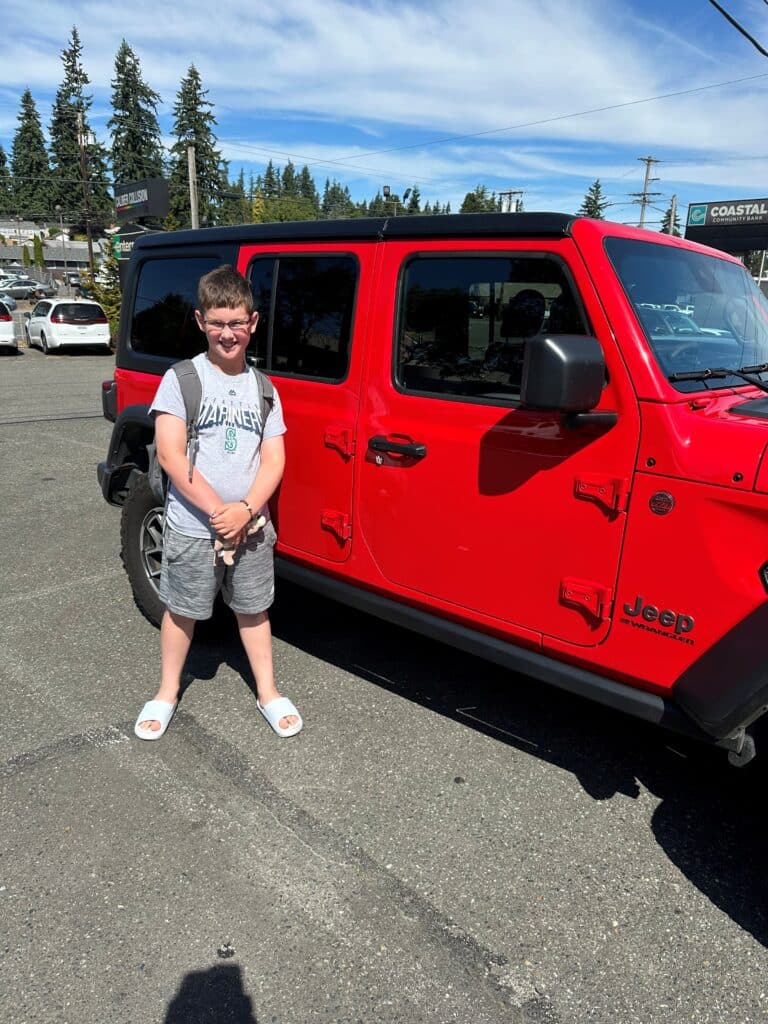
In my case, the damage to my van seemed pretty minor at first — a broken taillight from a parking lot backing incident. But when I brought it into the body shop, I learned the car wasn’t legally drivable with that taillight damage.
Thankfully, we had rental reimbursement coverage, and I was able to get a rental car the same day I dropped the van for repairs. Still, my car ended up in the shop for 10 days.
The reason? Modern vehicles are full of integrated electronics and sensors, so repairs often involve more than what’s visible on the surface. It’s one more reason to be prepared for longer-than-expected downtime.
Not sure if you have rental coverage? We’re happy to help you check.
4. Knowing your coverage before you need it makes everything easier.
Do you have collision coverage? What’s your deductible? Does your policy include roadside assistance or glass coverage?
These details matter when filing a claim — and knowing them in advance can save a lot of stress. (If your brain goes blank in the aftermath of a collision, don’t worry! Just reach out to our team for help – that’s why we’re here.)
Aja’s car was declared a total loss following her collision. Because it was an older vehicle, she didn’t carry collision coverage — a common and often practical decision. However, this meant that she didn’t receive any reimbursement for the value of the car. She relied on friends for transportation while she looked for a replacement and eventually bought a new car out-of-pocket.
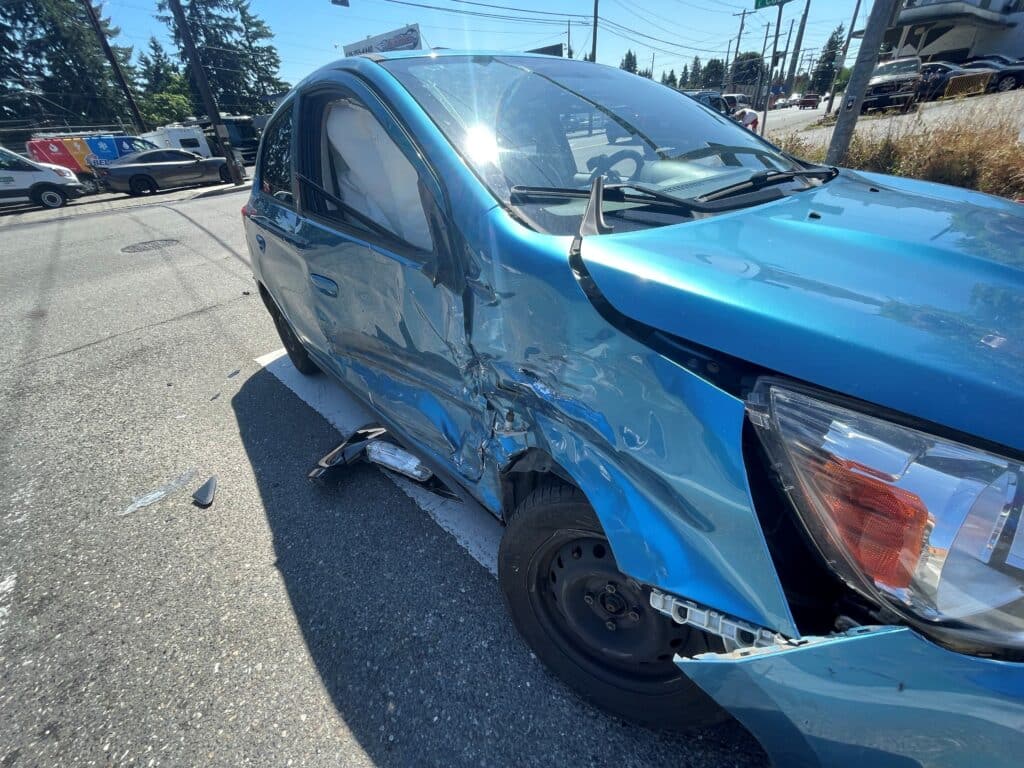
It’s a powerful real-life reminder of what it means to go without collision coverage — and something every car owner should consider carefully when reviewing their policy.
Removing collision coverage can lower your premium, but you’ll need to be prepared to cover all repairs or replacement yourself if you’re in an accident. We can help you find the best coverage option for your situation.
5. You’re allowed to feel rattled — and ask for help.
Accidents are emotional, not just logistical. It’s okay to feel shaken – even if it’s “just a fender bender.” Reach out to someone you trust. Nick was the first phone call for Aja and me – he even came to the scene of Aja’s accident to be a resource for her.
Remember that we’re here for you, whether you need help navigating the claims process or just want to talk through what happened.
Your McClain Insurance team is your accident resource
We hope you never get in a serious accident. But if you do, reach out right away.
Give us a call first. You can ask our team questions without filing a claim or impacting your rates.
You don’t have to figure it out alone — we’ll help with things like:
Understanding your deductibles and possible premium impact
- If your damages are less than your deductible amount, you’ll need to handle the repair costs out of pocket.
- Claims can impact your premium, even if no payment is made. We would never advise you to not use your insurance, but we can help walk you through the pros and cons of filing claims.
- In general, towing and comprehensive claims tend to have less impact on premiums than at-fault accidents, though there are exceptions.
Opening a claim
- If you decide to file a claim, we can help you submit it online or connect you with your carrier’s claims team.
- Your adjuster will usually be in touch within a day or two and will guide you through the process.
- If the other party is clearly at fault, we may advise you to file through their insurance, especially if they’re liable for the damages.
- If anyone is injured, you’ll want to open a claim right away. PIP (Personal Injury Protection) pays medical bills regardless of fault. We recommend our clients carry at least $10,000 in PIP coverage; some of our carriers require that as a minimum.
Helping you get repairs started
- As I shared above, in most instances, you can use any repair shop you want. If you don’t have a shop in mind, we can give you a list of your carrier’s preferred providers.
- Remember to get the entire estimate approved by the insurance company before you proceed with repairs
Providing vendor referrals
- For glass repair or towing, we can connect you with some of our experienced partners.
Being a resource during the claims and repairs process
- We’re fortunate to work with carriers who have a great track record for handling claims. But if you have any questions throughout the process or run into issues, that’s what we’re here for!
Post-Accident Realities: What Happened Next
Now that we’re a couple of weeks out from our accidents, we’ve had time to reflect — and deal with the longer-term outcomes. Aja is enjoying her new car and I’m back driving my minivan.
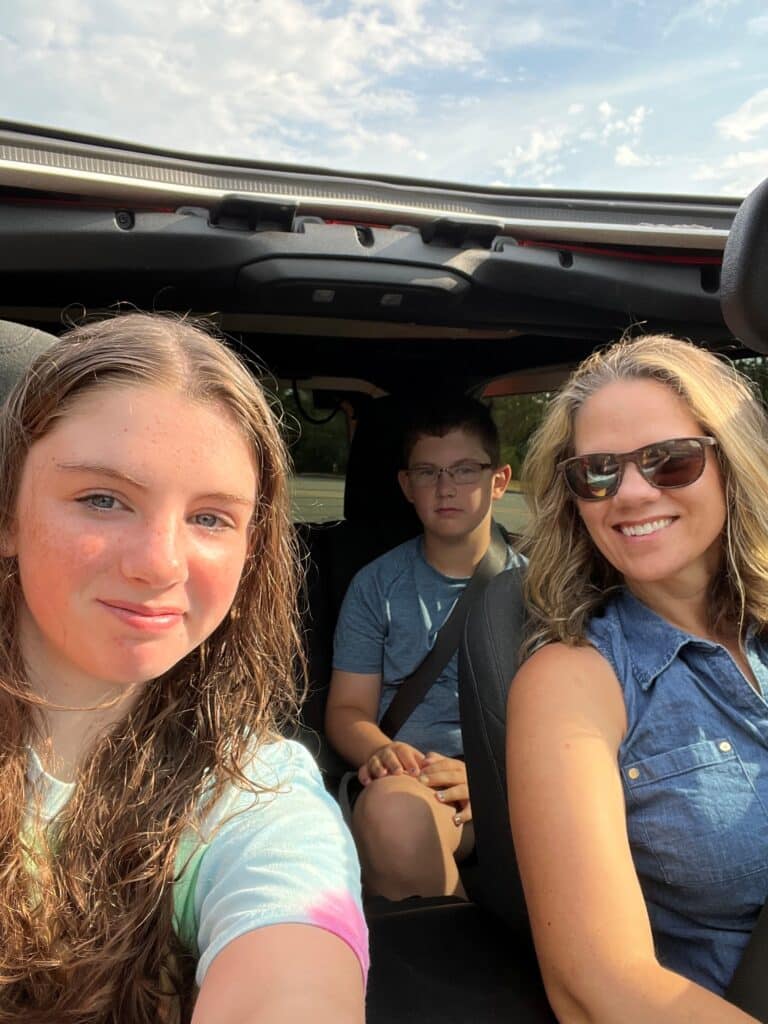
We both feel like we have a fuller picture of what it’s like to go through the claims process, especially when you’re juggling transportation, repairs, and real-life logistics after a crash.
Final Thoughts
These post-accident realities reminded us of something simple but important: even when you know how the system works, being in an accident is still disruptive. We’re sharing this because we want our clients to feel a little more prepared and supported — whether you’re reviewing your coverage or navigating a claim.
If this made you wonder whether your coverage would protect you the way you hope — or if you’re not sure what your deductible is, or if you have rental coverage — let’s talk. We’ve been there. And we’re here to help you feel more confident before anything ever happens.
Get in touch with our team today: www.autohomeboat.com/contact-us.
